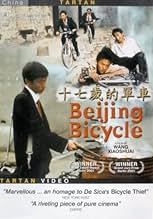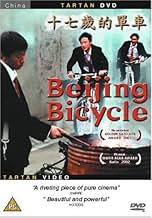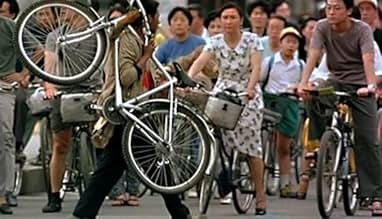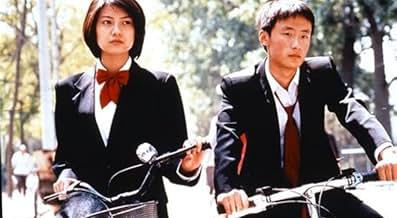IMDb RATING
7.2/10
4.8K
YOUR RATING
A seventeen-year-old country boy working in Beijing as a courier has his bicycle stolen, and finds it with a schoolboy his age.A seventeen-year-old country boy working in Beijing as a courier has his bicycle stolen, and finds it with a schoolboy his age.A seventeen-year-old country boy working in Beijing as a courier has his bicycle stolen, and finds it with a schoolboy his age.
- Awards
- 2 wins & 10 nominations total
Lin Cui
- Guo Liangui
- (as Cui Lin)
Guancheng Liu
- Mantis
- (as Lei Liu)
Featured reviews
"Beijing Bicycle" has a superficial similarity to "The Bicycle Thief," a true classic, but it presents a darker and deeper story. Set in Beijing it tracks the efforts of a young man from the countryside to find his self-sufficient place in a bustling and rawly energetic city. For him, obtaining a position as a bicycle messenger for a company serving the commercial firms of the city seems to be a satisfactory end, not a beginning as it probably would be were this film set in a Western metropolis.
For a New Yorker, where bicycle messengers are simultaneously often hated and frequently and with good measure feared, the operation of the Beijing counterpart, with messengers uniformly attired and equipped with identical mountain bikes, is both strange and familiar.
Central to the film is the theft of the coveted bicycle one day before it would become the personal property of the messenger (the company's scheme allows employees to earn ownership after what appears to be a short period of service). The bike turns up in the hands of a post-high school youth, part of a loose gang of bicycle worshipers. Much of the story revolves around the subsequent relay race of seizures of the bike with attendant and escalating violence.
The intensity of the competition between two young men for the bike reflects its importance not only economically (bikes appear in huge numbers in wide shots of broad avenues and busy streets) but also personally. These young men probably don't even have nocturnal fantasies of car ownership.
A wary but real bond develops between the suitors for bike ownership and the violence that engulfs them is palpably real and painful to watch. There is no real resolution for either of them it seems.
"Beijing Bicycle" would have benefited from some judicious editing and the deletion of an extraneous secondary story line (or two) that detracts from the main tale. The score is very nice and the acting strong. This is not the Beijing of Tianamen Square or of the flourishing fast food outlets. It is, however, a Beijing that has a number of striking similarities to neighborhoods known to many of us. And in that lies the film's interest and attractiveness.
For a New Yorker, where bicycle messengers are simultaneously often hated and frequently and with good measure feared, the operation of the Beijing counterpart, with messengers uniformly attired and equipped with identical mountain bikes, is both strange and familiar.
Central to the film is the theft of the coveted bicycle one day before it would become the personal property of the messenger (the company's scheme allows employees to earn ownership after what appears to be a short period of service). The bike turns up in the hands of a post-high school youth, part of a loose gang of bicycle worshipers. Much of the story revolves around the subsequent relay race of seizures of the bike with attendant and escalating violence.
The intensity of the competition between two young men for the bike reflects its importance not only economically (bikes appear in huge numbers in wide shots of broad avenues and busy streets) but also personally. These young men probably don't even have nocturnal fantasies of car ownership.
A wary but real bond develops between the suitors for bike ownership and the violence that engulfs them is palpably real and painful to watch. There is no real resolution for either of them it seems.
"Beijing Bicycle" would have benefited from some judicious editing and the deletion of an extraneous secondary story line (or two) that detracts from the main tale. The score is very nice and the acting strong. This is not the Beijing of Tianamen Square or of the flourishing fast food outlets. It is, however, a Beijing that has a number of striking similarities to neighborhoods known to many of us. And in that lies the film's interest and attractiveness.
Browsing through some of the previous comments, it seems many viewers take the movie primarily as an allegory of class clash in Beijing. While the movie does state the contrast with emphasis, it's much more interesting as a story about teens. The title translates literally to "seventeen years' bicycle."
The story is just that. Guo is a young man who earned a bicycle and promptly has it stolen. Through luck and perseverance, he finds it in the possession of Jian, a high school student. Trouble ensues.
I grew up in Taiwan, and I remember kids doing incredibly cruel things to each other. Not so much gunning down classmates but there were plenty of physical and emotional violence. This movie is a powerhouse of insight into the psyche of teenagers. Contemporary Hollywood pumps out teenage movies by the dozen each year, and most simply gloss over the amount of pain and awkwardness adolescence can bring. Beijing Bicycle, on the other hand, can serve as an instructional manual for any high-school bully wannabes on how to reduce the stammering geek next door to a shell of a man.
It's therefore understandable that the movie can be very difficult to watch at moments. Guo suffers humiliation after humiliation, and at times I wondered in frustration what it would take to get him to swing back (the ending provides some answer to that, I think). There is some humor in the movie, and Guo does have the resources to prevail occasionally. If you can stand two main characters respectively passive and oblivious, the story is an incredibly touching one about being young.
The story is just that. Guo is a young man who earned a bicycle and promptly has it stolen. Through luck and perseverance, he finds it in the possession of Jian, a high school student. Trouble ensues.
I grew up in Taiwan, and I remember kids doing incredibly cruel things to each other. Not so much gunning down classmates but there were plenty of physical and emotional violence. This movie is a powerhouse of insight into the psyche of teenagers. Contemporary Hollywood pumps out teenage movies by the dozen each year, and most simply gloss over the amount of pain and awkwardness adolescence can bring. Beijing Bicycle, on the other hand, can serve as an instructional manual for any high-school bully wannabes on how to reduce the stammering geek next door to a shell of a man.
It's therefore understandable that the movie can be very difficult to watch at moments. Guo suffers humiliation after humiliation, and at times I wondered in frustration what it would take to get him to swing back (the ending provides some answer to that, I think). There is some humor in the movie, and Guo does have the resources to prevail occasionally. If you can stand two main characters respectively passive and oblivious, the story is an incredibly touching one about being young.
Beijing Bicycle by Sixth Generation director Wang Xiaoshuai is an unsettling look at modern China in transition that depicts the relationship between two young men of different social status, both yearning for acceptance and stubbornly determined to succeed. Guei (Cui Lin) is an unexpressive working class 17-year old who has come to Beijing to find work, while Jian (Li Bin), is a sophisticated middle-class student, desperate to belong, seeking approval from his biker friends and his beautiful girlfriend Gin (Zhao Yiwel). The film explores the consequences when Guei's bicycle is stolen and ends up in Jian's hands. The bicycle represents an escape for both from the competitive pressures of their lives. For Guei, it is a means of access to a job, an income, and survival. For Jian, it is the pathway to being "cool" and being in the in-group, much like what the flashy sports car represents to young men in Western countries.
As the film opens, a group of boys are being interviewed for a job as a courier. Enticed by the prospect of owning a silver mountain bike, Guei takes the job and begins to save money to buy the bike, given to him as a loan (the bike is his once he has earned 700 yuan, which is about $85). Out of his element in the bewildering city, Guei runs into an awkward situation almost immediately when he makes a delivery in a luxury hotel and is directed to the gym where he is forced to strip for a shower before he can deliver his package. He is then asked to pay for the shower when he leaves but does not have enough money. When his bike is stolen just one day before he can become the owner, Guei's job is threatened.
Xie Jian as Guei's manager is both abrasive and compassionate and offers to take Guei back to work if he can find his bike. In a city where bicycles are still the most common means of transportation, against all odds he sets out to find it. The film is about the bicycle but is also about the city of Beijing. Guei's search for the bicycle takes him into all corners of the city. With an original score by Felix Wang and magnificent cinematography by Jie Liu, the city comes alive with streets littered with traffic juxtaposed with mysterious alleys where old men play board games or do Tai Chi. Wang adds the little touches as well such as two friends sharing a toothbrush and a single spigot of water in an alley serving an entire neighborhood.
Like De Sica's The Bicycle Thief, the stolen bicycle is central to the story, but here it is not about the hunt but about the consequences that follow from its recovery. When the student Jian is found with the bike, both he and Guei assert ownership and the bike is stolen and reclaimed by both boys several times, each time ending in a scuffle with Jian's friends. In a powerful confrontation with his father, Jian, in a rage against his father for reneging on his promise to buy him a bike, finally admits to stealing his father's money to purchase the bike himself at the flea market after it was fenced. The two boys are pitted against each other but mutual need brings them together and allows them to work out a compromise by alternating the days when each can use the bike. Eventually a serious confrontation takes place that escalates into a startling conclusion.
Beijing Bicycle is a deeply human odyssey that, while somewhat repetitive, never loses its rhythm. Though there is little dialogue and the characters communicate mostly with body language, long silences, and facial expressions, the actors perform their roles with astonishing authenticity. Parts of the film are emotionally upsetting, but there is also a sweet innocence at play. Jian acts like a typical adolescent-surly, angry with his parents, shy with girls, audacious and impetuous one minute, and then needy and contrite the next. In one of the concluding scenes, as a group of punks chase two boys through a an older section of Beijing; one says to the other, "What are you doing? This doesn't concern you." The other replies, "I don't know my way out." In today's new China, caught between the traditions of an ancient culture and the new urban reality, young people are having trouble finding their way out.
As the film opens, a group of boys are being interviewed for a job as a courier. Enticed by the prospect of owning a silver mountain bike, Guei takes the job and begins to save money to buy the bike, given to him as a loan (the bike is his once he has earned 700 yuan, which is about $85). Out of his element in the bewildering city, Guei runs into an awkward situation almost immediately when he makes a delivery in a luxury hotel and is directed to the gym where he is forced to strip for a shower before he can deliver his package. He is then asked to pay for the shower when he leaves but does not have enough money. When his bike is stolen just one day before he can become the owner, Guei's job is threatened.
Xie Jian as Guei's manager is both abrasive and compassionate and offers to take Guei back to work if he can find his bike. In a city where bicycles are still the most common means of transportation, against all odds he sets out to find it. The film is about the bicycle but is also about the city of Beijing. Guei's search for the bicycle takes him into all corners of the city. With an original score by Felix Wang and magnificent cinematography by Jie Liu, the city comes alive with streets littered with traffic juxtaposed with mysterious alleys where old men play board games or do Tai Chi. Wang adds the little touches as well such as two friends sharing a toothbrush and a single spigot of water in an alley serving an entire neighborhood.
Like De Sica's The Bicycle Thief, the stolen bicycle is central to the story, but here it is not about the hunt but about the consequences that follow from its recovery. When the student Jian is found with the bike, both he and Guei assert ownership and the bike is stolen and reclaimed by both boys several times, each time ending in a scuffle with Jian's friends. In a powerful confrontation with his father, Jian, in a rage against his father for reneging on his promise to buy him a bike, finally admits to stealing his father's money to purchase the bike himself at the flea market after it was fenced. The two boys are pitted against each other but mutual need brings them together and allows them to work out a compromise by alternating the days when each can use the bike. Eventually a serious confrontation takes place that escalates into a startling conclusion.
Beijing Bicycle is a deeply human odyssey that, while somewhat repetitive, never loses its rhythm. Though there is little dialogue and the characters communicate mostly with body language, long silences, and facial expressions, the actors perform their roles with astonishing authenticity. Parts of the film are emotionally upsetting, but there is also a sweet innocence at play. Jian acts like a typical adolescent-surly, angry with his parents, shy with girls, audacious and impetuous one minute, and then needy and contrite the next. In one of the concluding scenes, as a group of punks chase two boys through a an older section of Beijing; one says to the other, "What are you doing? This doesn't concern you." The other replies, "I don't know my way out." In today's new China, caught between the traditions of an ancient culture and the new urban reality, young people are having trouble finding their way out.
A bit irritating at times and certainly not a regular fare even for those used to Asian movies. The story revolves around ideas of going up the social ladder... about how material goods can change your status, and what can happen due to greed.
The main character a peasant from the countryside finds himself in the "wild" urban enviroment and all its impersonal aggresiveness. The big city is unforgiving. The way the main characters tend to react to otherwise incredibly hard situations with silence sure is different from western standards.
Overall a beautiful movie with some very good scenes... still slow at times and could have been better 7 in 10.
The main character a peasant from the countryside finds himself in the "wild" urban enviroment and all its impersonal aggresiveness. The big city is unforgiving. The way the main characters tend to react to otherwise incredibly hard situations with silence sure is different from western standards.
Overall a beautiful movie with some very good scenes... still slow at times and could have been better 7 in 10.
I really enjoyed watching this film for a second time recently. A story of a young peasant from the outskirts of town (Beijing) struggle against societal oppositions, finding work, keeping bike from preying thieves, and learning survival skills. Beijing is not an easy town to tame!
At times very funny! At times very violent, makes you want to turn your head in disgust. The violence is to prove a point. No good comes from it, whatsoever!
I think this film is well made. The pace is smooth. The acting is superb. I especially like the acting of the employer who hires the main character as a messenger boy. He is what you would call a prudent business man with heart!
Please take some time out of your day and watch this tense movie with moralistic themes: rich versus poor, right versus wrong, bullying versus stubbornness. A winner in my book!
At times very funny! At times very violent, makes you want to turn your head in disgust. The violence is to prove a point. No good comes from it, whatsoever!
I think this film is well made. The pace is smooth. The acting is superb. I especially like the acting of the employer who hires the main character as a messenger boy. He is what you would call a prudent business man with heart!
Please take some time out of your day and watch this tense movie with moralistic themes: rich versus poor, right versus wrong, bullying versus stubbornness. A winner in my book!
Did you know
- TriviaThe arcade game that Jian and his friends play is "Dance Dance Revolution".
- How long is Beijing Bicycle?Powered by Alexa
Details
- Release date
- Countries of origin
- Official sites
- Language
- Also known as
- Xe Đạp Bắc Kinh
- Filming locations
- Production companies
- See more company credits at IMDbPro
Box office
- Gross US & Canada
- $66,131
- Gross worldwide
- $215,854
- Runtime
- 1h 53m(113 min)
- Sound mix
- Aspect ratio
- 1.85 : 1
Contribute to this page
Suggest an edit or add missing content












